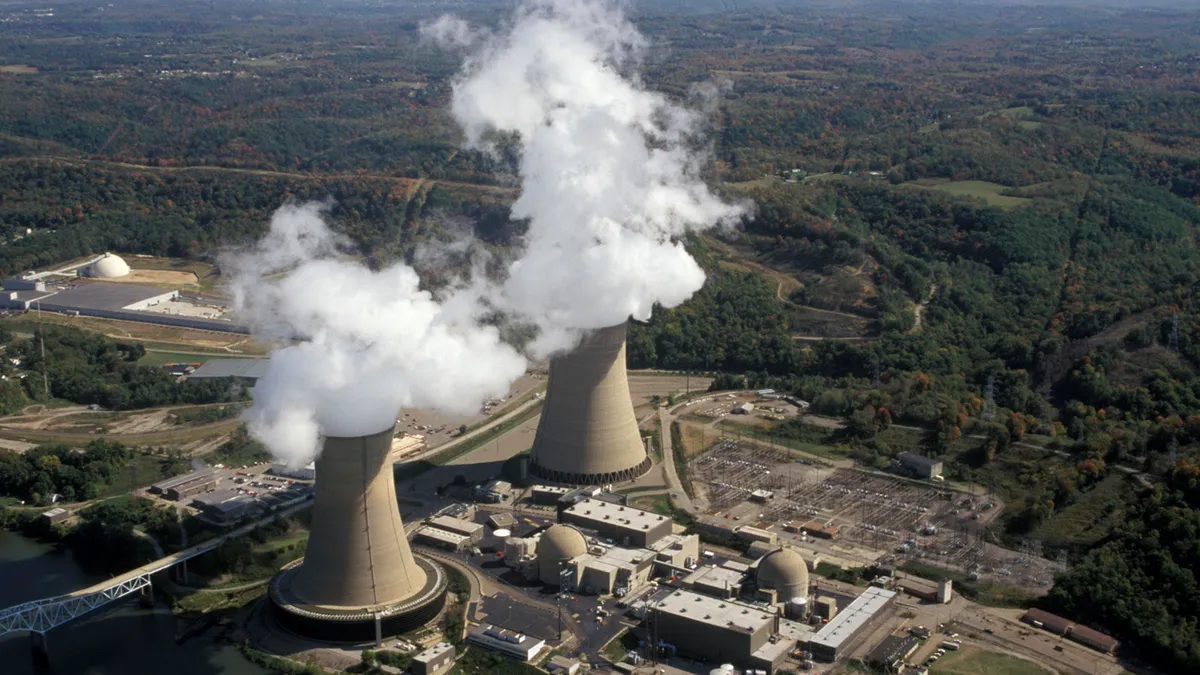UPDATE: Nov. 5, 2020: The Public Utilities Commission of Ohio on Wednesday initiated an audit of FirstEnergy's compliance with corporate separation laws and regulations. The commission told its staff to issue a request for proposals for an independent third party to conduct the audit, which will be due April 21. Information recently filed by FirstEnergy with the Securities and Exchange Commission indicating an internal investigation by the company, "warranted further examination of compliance with corporate separation regulations by FirstEnergy’s electric distribution utilities and its affiliates," the commission said.
Dive Brief:
- FirstEnergy has been dealing with an ongoing U.S. Securities and Exchange Commission (SEC) investigation since the company and certain officers received subpoenas from the SEC on Sept. 1, the company's new management team told analysts on Monday during its third quarter earnings call, and in an 8-K filed just before the meeting.
- S&P downgraded FirstEnergy corporate bond rating to less than investment grade last Friday, a day after the company's board fired CEO Charles "Chuck" Jones, the company reported in investor materials posted on its website prior to the the earnings call. Fitch also downgraded the rating but not below investment grade. Moody's affirmed its current rating (Baa3), but kept a negative outlook.
- In a move seen as key to the company's long-term survival, FirstEnergy's Board of Directors has created an investigative committee to review — and if necessary strengthen — the company's "internal governance" policies and determine whether employees are or have been in compliance with it.
Dive Insight:
FirstEnergy's new interim management team declined to give further details on the internal governance audit or to speculate on the possible outcomes of the SEC investigation. The team also did not comment on the ongoing Justice Department racketeering probe that led to the indictment of the former speaker of the Ohio House of Representatives and four associates on racketeering charges in connection with legislation designed to bail out former FirstEnergy nuclear plants. FirstEnergy received subpoenas in that investigation as well.
The effort by the company's Board to take control and stabilize the situation was apparent during the analyst conference with the active participation of Christopher Pappas, an independent member of the company's board and executive director, to whom acting CEO Steven Strah directly reports. Pappas himself will continue to report to Donald Misheff, non-executive chairman of the Board.
Pappas tried to make it clear to analysts that Strah, who had been appointed president of FirstEnergy last spring, had been in line to succeed Jones before any of the federal investigations were known. Strah began his FirstEnergy career in 1984 and was named chief financial officer in 2018.
In answer to an analyst's question about credit rating downgrades, Pappas said the actions of the credit agencies were "related to governance issues" and said that is why the board has created a special committee to focus on corporate standards of conduct.
"I think it's going to take some time for us to work through this. But our focus is going to be improving on those types of matters so we can get the rating back to investment grade," he said.
The special committee probing FirstEnergy's corporate standards of conduct is expected to report its initial findings in the spring of 2021.
Pappas also addressed the decision that led to the firing of former CEO Jones.
"During the course of our internal review related to the ongoing government investigation regarding HB6, the Independent Review Committee of the Board determined that three executives violated certain FirstEnergy policies and its code of conduct," he told the analysts.
"When we determine that employee conduct is inconsistent with our policies and values, no matter how senior the individual, we have a duty to take action; and that is what we have done here."
Jones began his FirstEnergy career in 1978 as an engineer. He was named CEO in 2015.
Though analysts had few, if any, questions about FirstEnergy's earnings, the company did report healthy profits for the quarter, beating its predictions by a penny per share. The company said it earned $454 million, or 84 cents per share, on revenues of $3 billion for the quarter. That compares to $391 million, or 72 cents per share on revenues of $3 billion in the third quarter of 2019.
Though deliveries of power to commercial and industrial customers have lagged this year due to the pandemic, the increases in residential consumption more than made up financially for the C&I declines.
Strah said the company is reaffirming its previous guidance of $2.40 to $2.60 per share for the year.














